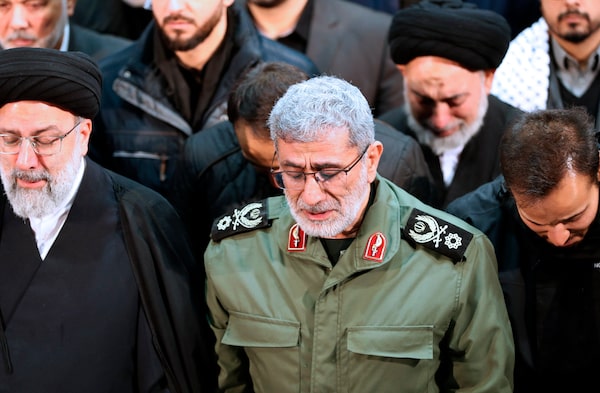
While General Qassem Soleimani was an increasingly high-profile leader in Iran’s foreign operations who became a national hero as Iranian influence widened, General Esmail Ghaani, seen here on Jan. 6, 2020, spent most of his time as a bureaucrat and an administrator in the shadows, focusing on supply lines and counterintelligence.The Associated Press
Within 12 hours of the U.S. assassination of Iranian military commander General Qassem Soleimani, the vacancy was swiftly filled.
His successor, his long-time deputy Esmail Ghaani, is now one of the most powerful men in the Middle East, controlling a vast network of Iranian forces and radical militias in five countries. Yet he lacks the charisma and connections of his predecessor, raising questions about whether his ascendancy might mean that Iran’s influence will erode, at least temporarily.
Gen. Ghaani’s appointment was announced on Friday by Iran’s Supreme Leader Ayatollah Ali Khamenei, who promised continuity in the policies of Iran’s military forces. The rapid move, authorized by Iran’s top leader, left no doubt that he was the anointed successor, having served as the heir apparent and deputy to Gen. Soleimani for the past 12 years.
His rhetoric is as fiery as that of his predecessor. “God the Almighty has promised to take martyr Soleimani’s revenge,” he told state television after the assassination.
A closer look at his career suggests that he has a similar background to his predecessor, but lacks the natural command and shrewd personal skills that allowed Gen. Soleimani to dominate Iran’s network of proxy militias and allies.
The two military officers both fought on the front lines in the prolonged and bloody war between Iran and Iraq in the 1980s, in which at least 500,000 soldiers died. It was a formative experience for both. “We are children of war,” Gen. Ghaani once said. “We are war comrades, and it was the war that made us friends.”
After the end of the Iran-Iraq war, Gen. Ghaani joined the newly created Quds Force, the elite foreign branch of Iran’s Islamic Revolutionary Guards Corps, which has expanded its operations to Syria, Lebanon, Iraq and Yemen, while also supporting Palestinian radical militias.
But while Gen. Soleimani was an increasingly high-profile leader in Iran’s foreign operations who became a national hero as Iranian influence widened, Gen. Ghaani spent most of his time as a bureaucrat and an administrator in the shadows, focusing on supply lines and counterintelligence, along with border activities on Iran’s eastern boundaries with Afghanistan and Pakistan, where he is believed to have campaigned against drug smuggling.
“Their styles are remarkably different,” said Ali Alfoneh, a senior fellow at the Arab Gulf States Institute in Washington, in an early analysis of the two men in 2012.
“While the charismatic Soleimani, particularly in his youth, managed to move men with his simple vocabulary and deeply personal and humble style, Ghaani’s speeches seem completely impersonal and rehearsed and do not reveal much about him,” he wrote in the analysis.
“While Soleimani is usually more direct in his speeches, Ghaani hides behind official rhetoric.”
Despite the sharp contrast in their personal styles, however, Iran’s military policies and foreign activities are unlikely to shift much. “Under Ghaani’s leadership, there is likely to be greater continuity than change in the Quds Force,” Mr. Alfoneh wrote in a commentary on Friday after the U.S. assassination.
Israeli security experts, who watch Iran closely because of its threats to Israel, believe that Iran will be temporarily weakened because Gen. Ghaani won’t be able to step easily into the boots of his boss. Much of Gen. Soleimani’s power had stemmed from his personal connections and diplomatic expertise from Damascus to Moscow, which aren’t recorded in institutional documents for his successor to read.
“He is not easily replaceable,” said Yoel Guzansky, an Iran expert at the Israel-based Institute for National Security Studies, in an interview with The Globe and Mail. “This is a huge blow to Iran.”
Gen. Ghaani has operated so much in the bureaucratic backrooms that even his exact age is unclear. Various reports suggest that he is 61, 62 or 63. He is believed to be from the northeastern Iranian city of Mashhad.
In 2012, he was hit with sanctions by the U.S. Treasury, which alleged that he had authority over “financial disbursements” to Iranian-backed proxy militias. He was specifically cited for a shipment of rockets and other weapons, hidden in shipping containers and intercepted in a Nigerian port in 2010.
While he certainly lacks his predecessor’s fame and popularity, it could be a mistake for the world to underestimate Gen. Ghaani’s experience and his determination. He is “as radical as Soleimani,” according to David Menashri, a scholar of modern Iranian history who was founding director of the Alliance Center for Iranian Studies at Tel Aviv University.
“I think Iran is pondering what to do, and it has a long history of smart and shrewd politicians,” he told The Globe in an interview.
“They play chess. They don’t play backgammon, where you throw the dice and pray to God.”
 Geoffrey York
Geoffrey York